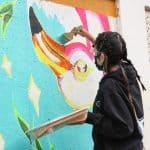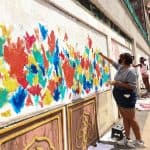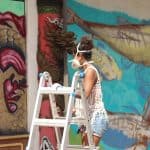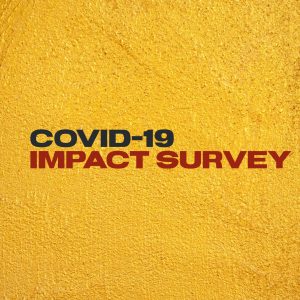Initial fund provides more than $120,000 in small grants for individuals
Thousands of individual artists and creative workers have already lost contracts, gigs, and teaching work as a result of the COVID-19 pandemic. Performance cancellations, closures and physical distancing requirements are having a devastating impact on greater Portland’s creative community. In Multnomah County alone, more than 900 individual artists responding to a recent survey estimated over $9 million in lost income March through May, 2020.
In the face of this unprecedented crisis, the Regional Arts & Culture Council April 2, 2020 announced a new fund to provide some financial relief to Portland area creative professionals and the region’s cultural workforce. RACC’s Emergency Fund for Artists and Creative Workers, offers financial assistance to cover lost income to artists experiencing economic hardship.
New donations to the fund will be distributed directly to individual artists and creative workers in need along with more than $120,000 in unrestricted funding RACC has redirected from other programs. Applications to the emergency fund open on April 2, 2020 and should be submitted online no later than 5 p.m. Monday, April 13, 2020 for initial consideration. As new funds are donated and identified, RACC will award additional funds.
“Our artist community has lost much but it remains rich with diversity of skills, resources and creativity,” said RACC Executive Director, Madison Cario. “That’s why it’s essential that in the short-term RACC look at all available resources, ramp up partnerships, and raise money. We will be looking to the arts community to innovate with us to create longer-term solutions and creative ideas that will support our resilience and recovery.”
RACC’s Emergency Fund for Artists and Creative Workers supports individuals who have experienced a financial loss due to the COVID-19 pandemic. The fund is open to artists at all levels of their careers, in a broad variety of disciplines. Applicants will be asked to share evidence of their artistic practice, household income, and financial loss in the application. RACC will make awards up to $500 in order to support as many individual artists as possible, prioritizing those without access to other COVID-19 relief funds.
“It’s not just individual artists who are losing out as a result of the pandemic; the whole region risks losing much of our artistic wealth and with it the contributions of individual creators who inspire and uplift us, and who can help our spirits heal from this disaster,” stated Linda McGeady, RACC Board Chair. “RACC is being nimble and creative, and staff is working hard to get dollars out the door as quickly as possible.”
The picture of the impact of COVID-19 on the arts community came into sharp focus last week as RACC released results from a statewide survey. The survey collected estimated losses from individuals and arts organizations during March, April and May. Statewide, losses were reported at more than $56 million for artists and arts organizations in just a three-month period. The survey did not include a response from the Oregon Shakespeare Festival, which has subsequently announced it will delay reopening of its 2020 season until September and laid off a majority of staff.
Many artists responding to the survey offered examples of how restrictions on group sizes, public gatherings and requirements for physical distancing during this health crisis are affecting their income and their community.
- A self- employed visual artist explained, “My galleries are ALL closed – including a major solo show – and my classes are ALL cancelled. I have stopped submitting to future shows. My solo and two-person shows this summer are in limbo. My income is sporadic by nature so I can’t tell you what would have sold had the galleries remained open.”
- A Saturday Market vendor shared how they rely on tourism to support and sustain their revenue, which currently is reduced to nothing.
- A local animator, currently employed on a stop-motion feature film being made in Portland, described how their team typically works as a large crew, in close proximity. Initially shut down for two weeks, the film – and team – is on hiatus indefinitely.
- A musician who makes their income by composing and producing music described how they also own and operate a recording studio, which is now shuttered. “My income not only helps provide food for my family, but also helps keep the lights on at the studio.”
More emergency relief measures for artists and arts organizations are in the works. RACC is currently reviewing all projects and programs as potential relief funds, as well as any new sources anticipated in next fiscal year, starting July 1, 2020. Information about new opportunities will be shared with the community as they are confirmed by RACC staff, board members and funding partners in the coming weeks.
More information about RACC’s Emergency Fund for Individual Artists can be found here: https://artsimpactfund.racc.org/covid-19/
Para solicitar asistencia para la aplicación en un idioma que no sea inglés, envíe un correo electrónico a: grants@racc.org
在申请过程中,如果您需要语言上的帮助请发邮件到:grants@racc.org






